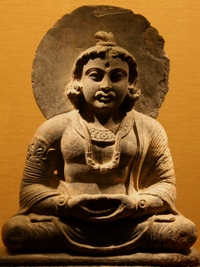| Pages in topic: < [1 2 3] > | How do you know that you are an excellent translator? Thread poster: Dinny
|
|---|
RobinB 
United States
Local time: 00:10
German to English
| Speak for yourself.... | Nov 22, 2005 |
Kirill Semenov wrote:
No, you are not. Nobody is.
Speak for yourself, is all I can say there. You may never personally have come across an excellent translator, but there are certainly some out there. You might even bump into the odd one on ProZ.
As one of good friends of mine said, `There are perfect translations, but a perfect translator doesn't exist'. Please think about it. Everyone.
Your friend got things a bit mixed up, I think. There are *no* perfect translations, and consequently no perfect translators.
But there are most certainly are excellent translations, and excellent translators.
Translators strive for (and some of them actually achieve) excellence, not perfection. The concept of perfection doesn't exist in a professional translator's vocabulary.
| | | | | A round of applause | Nov 22, 2005 |
RobinB wrote:
There are *no* perfect translations, and consequently no perfect translators.
But there are most certainly are excellent translations, and excellent translators.
Translators strive for (and some of them actually achieve) excellence, not perfection. The concept of perfection doesn't exist in a professional translator's vocabulary.
Well said, Robin!
| | | | Lars Jelking 
Israel
Local time: 08:10
English to Swedish
+ ...
| Utopia found. | Nov 22, 2005 |
You achieved that when that normally stingy agency, the one that always haggle over your rate, suddenly pays in full, on time and send you more jobs without you begging for it.
| | | | | Excellent, Wayne! Did you mean superior or just very good? | Nov 22, 2005 |
I wonder, dear Dinny, how do you personally define excellence (especially with regard to translating)?
My second question would be, what qualities do you strive for (especially with regard to translating)?
I suspect that the lists will be very similar.
But if the second list actually comes up empty, then you can continue on to "translator nirvana" (BTW - you can go ahead and collect $200 on your way up).
Rafa Lombardino wrote:
I believe the search for excellence is important quote]
I share this belief - we must continue to strive for excellence.
But let's not take ourselves all too seriously... This is what Merriam-Websters has to say: http://www.m-w.com/cgi-bin/audio.pl?excell03.wav=excellent (and it's defined here: http://www.m-w.com/dictionary/excellent ). Note that the definition of "excellence" as "superior" is considered archaic!
| | |
|
|
|
| I will be excellent | Nov 22, 2005 |
when I hit a turnover of 300 keuros a year working only 45 hours a week, without subcontracting and without ripping people off. That would mean customers are ready to pay whatever it costs to get an excellent translator...
I would like to translate for glory and worldwide (or even wider) recognition, but I only translate to earn a living. Sad, ain't it?
So my way to gauge how much progress towards excellence I make every year is my bottom line.
Have a nice day,
Philippe
| | | | Fred Neild (X) 
English to Spanish
+ ...
| I agree there are no excellent translators | Nov 22, 2005 |
Dinny wrote:
But I would like to be an EXCELLENT translator.
Maybe I am.
The day you know you are an excellent translator is the day you will become a mediocre one, because you will stop learning.
| | | |
I fully agree with Fred... The day you think you are "excellent", you may stop learning. Who doesnt learn anything new by simply reviewing the KuDoZ?
| | | | Dinny 
Greece
Local time: 08:10
Italian to Danish
+ ...
TOPIC STARTER
I have enjoyed reading your comments, and I still don't think it's a waste of time to ponder on whether I'm an excellent or an average translator. If I stopped caring about the answer to that question it would mean that I would be happy with being "good enough", the graveyard of all innovation.
I very much agree with Rafa:
"I believe the search for excellence is important, 'cause that's what pushes you a little further in learning more and doing a better job."
A... See more I have enjoyed reading your comments, and I still don't think it's a waste of time to ponder on whether I'm an excellent or an average translator. If I stopped caring about the answer to that question it would mean that I would be happy with being "good enough", the graveyard of all innovation.
I very much agree with Rafa:
"I believe the search for excellence is important, 'cause that's what pushes you a little further in learning more and doing a better job."
And Francisco also hits the head of the nail: If you ever begin to think you're an excellent translator, go and answer some KuDoZ questions! ▲ Collapse
| | |
|
|
|
As a French native, I am lucky enough to get direct feedback from the PMs...
But they also mention revisors saying my translation was excellent, or (in the case of large agencies using several free-lancers for a specific language pair) end clients asking for only me to translate their documents and preferring to postpone the deadline when I am not available.
You can also tell when they ask YOU to recommend them reliable colleagues when you are too busy to satisfy all their req... See more As a French native, I am lucky enough to get direct feedback from the PMs...
But they also mention revisors saying my translation was excellent, or (in the case of large agencies using several free-lancers for a specific language pair) end clients asking for only me to translate their documents and preferring to postpone the deadline when I am not available.
You can also tell when they ask YOU to recommend them reliable colleagues when you are too busy to satisfy all their requests.
Also, why not just ask about your translations which have been revised? or about the end client's feedback?
That's what I do when I perform translation tests, mentionning that any input/feedback is welcome.
You might also consider outlining a very short questionnaire with up to 5 questions focussing on what you really want to know, and sending it to the people you are used to work for.
Hope that helps!
Have a good day,
J. ▲ Collapse
| | | | | Good questionning, Dinny | Nov 23, 2005 |
I also enjoyed all the comments, although opinions are very divided.
I understand your concern. I don't have an experience of 15 years, only 4, really full time.
I have had many proofreaders (often paid by me) from whom I got the final version of the translation. I don't need more feedback, I'm able to see whether the changes were necessary or optional and make my own opinion about the proofreader.
I had a mentor who used to proofread all the translations ... See more I also enjoyed all the comments, although opinions are very divided.
I understand your concern. I don't have an experience of 15 years, only 4, really full time.
I have had many proofreaders (often paid by me) from whom I got the final version of the translation. I don't need more feedback, I'm able to see whether the changes were necessary or optional and make my own opinion about the proofreader.
I had a mentor who used to proofread all the translations I did in the first year I was working and all I could do was admire him. Since then I have grown up and don't feel the need to be proofread for more than a few sentences most of the time. But I recently had to ask my ex-mentor to proofread a translation and I felt like a beginner again. It was useful to confirm to me that I had improved but also that the way to perfection is very long, that you never end learning. It also confirmed that he's really good and that 4 years ago I was already able to make the difference between an excellent translator and another one.
I think that translation skills are like money: you'll always find those who have more than you and those who have less than you and depending on your philosophy of life you'll look one group more than the other.
In your situation, if you're ready to pay for it, I'd post a job and ask for a proofreading without saying that you're the translator. I'd also post a translation test to chose the best.
The results will always be interesting.
Claudia ▲ Collapse
| | | | Javier Herrera (X)
Spanish
| Feedback from proofreaders | Nov 23, 2005 |
Gianfranco Manca wrote:
1. Studying carefully any comment received from reviewers.
I read this message yesterday and I consiered it a good point. I didn't think much about it, though.
Now, today I've just received some feedback from a proofreader and I'm shocked. He or she makes horrible grammatical mistakes, never heard about false friends, doesn't know when to use capitals, or when not to use them, which is more important...
Sorry, I had to vent my anger, it's probably happened to many of you.
Now, I don't know if I'm an excellent translator but I know what an appalling one is.
| | | | Samuel Murray 
Netherlands
Local time: 07:10
Member (2006)
English to Afrikaans
+ ...
| Some answers... | Nov 23, 2005 |
Dinny wrote:
When clients are never returning, it’s possible you’re just not good enough.
Some clients find it so hard to find a translator that they feel even remotely comfortable with, that they'll stick to you even if your translation is mediocre as long as your behaviour is more professional than the others'.
I've done some rush jobs for people in the past, when I know that the quality of the work is not as high as I would have liked it to be, only to have these clients call me back saying how impressed they were with the translation (living in a bilingual country means that the client often speaks both languages even though he can't write or translate in both).
Like the boss coming into your office, slamming your latest translation on your desk and exclaiming: This is junk! 
No... but recently our office had two very important new clients who insisted that we do the translation because they liked what they saw in our other translations. Just to fill you in... I work for a newspaper's advertising department, so all of our translations can be seen the next day by everybody. Clients who advertise in the paper can either have the translation done by an outside agency, or by us. The fact that our office was chosen by two important clients over some very well known outside advertising agencies and translation bureaus... well, that says something, doesn't it?
Add to that the fact that an outside firm probably spends the whole day on a single text (because they are more expensive), whereas we have to do between 20 and 50 different translations per day (often multitasking, because less urgent documents must be put on hold if a more urgent one suddenly comes along), then there's reason to feel satisfied about oneself.
| | |
|
|
|
Angus Woo
Local time: 13:10
Chinese to English
+ ...
| A clear definition is needed | Nov 24, 2005 |
There could be no answer for this unless the definition of an excelent translator is first provided.
Anyone can say that I am an excellent translator. Personally I think that doesn't mean anything.
If an explicit definition is given, then the question would be where can you find objective proof of that.
| | | | | It's a question of taste..... | Nov 25, 2005 |
I think that one important thing to remember is to stick to what we know. Trying to translate documents in a field which you did not study is a recipe for disaster!
Some clients are NEVER happy anyway and you will find that they are usually the bad payers or those who have not got a clue what translating means. They think that one needs to just press a button and here we are, the translation is done.
It's also amazing to see that you can be classified as a bad translat... See more I think that one important thing to remember is to stick to what we know. Trying to translate documents in a field which you did not study is a recipe for disaster!
Some clients are NEVER happy anyway and you will find that they are usually the bad payers or those who have not got a clue what translating means. They think that one needs to just press a button and here we are, the translation is done.
It's also amazing to see that you can be classified as a bad translator because you used a slightly different word to their internal/inhouse proofreader!! Recently I had an argument with a client over a simple word ''speaker'' as for a Conference Speaker. The project was commissionned by the European Union and needed to be translated into French so I used the official term ''Orateur''- Their proofreader wanted to use ''intervenant'' which is not a usual term to my knowledge. Anyway, I won in the end by sending them the direct link to the European Union dictionary....
As I say, being a good translator is a very subjective thing so there is no real answer to this question.
Christine Andersen wrote:
One agency I work for is very good at passing on feedback. They ask their clients how satisfied they are and try to find out why or why not.
If the client is satisfied, they tell the translator - and send future jobs from that client to the same translator if possible.
If the client is not happy, then maybe a different translator knows more about the business/industry in question. On one occasion I had read up some technical support material, and the client said the translation looked like their competitor's publicity! We discussed it and changed the tone a bit... There are subtle differences sometimes! That client has come back several times for more.
In many of the texts I translate, clients have their own style, and the translation has to fit in with their image. Some want to appear as the sober experts with decades of experience (lawyers, for instance). Others don't want you to think of yesterday - it's dead and gone, and their products are for tomorrow and next year...
It's hard to define what 'excellence' is. I do my best every time, but I don't know everything. You can't define excellence only by examining your own work. You need contact from outside.
The only way is to try and get through to the end clients somehow. They know as a rule what they are looking for - but I admit is is far easier with English as the target language than with Danish, which many PMs have to take on trust! ▲ Collapse
| | | | | A couple of small points to add to the above | Nov 28, 2005 |
Just a few points to consider when you ask yourself this question and other related ones.
1. Your **success** as a translator can be measured in concrete terms, yet **excellence** does not equal success.
2. **Perfection** cannot be achieved, yet **excellence** is not the same as perfection (as noted before - this is just to summarize).
3. Here's something that I think Kirill might agree with (from the way I read his post). Someone said, "Winners compare their achievement... See more Just a few points to consider when you ask yourself this question and other related ones.
1. Your **success** as a translator can be measured in concrete terms, yet **excellence** does not equal success.
2. **Perfection** cannot be achieved, yet **excellence** is not the same as perfection (as noted before - this is just to summarize).
3. Here's something that I think Kirill might agree with (from the way I read his post). Someone said, "Winners compare their achievements with their goals, while losers compare their achievements with those of other people." For a lot of people, believing in something is more important than knowing it. Do you want something that you can believe and be happy about it? Or do you really want the answer in the form of a percentile or a test score? Different people will choose different answers and both may be right - for themselves.
It seemed that I had more to say, but either the thoughts slipped my mind or were never there.
Oh ok, here it is:
4. I would assume that the question would be different (the criteria would be different) for very experienced translators (10+ years) and all the other ones (establishing themselves, doing part-time translation, not 100% devoted to translation and so on). If you have little room for improvement - if you've perfected your craft to the extent you are capable of - then you have a "finished product" and can judge it accordingly. However, if you are still growing as a translator, you will likely be evaluating your progress (at least in part) in addition to the quality you now provide.
Cheers to all!
[Edited at 2005-11-30 14:02] ▲ Collapse
| | | | | Pages in topic: < [1 2 3] > | To report site rules violations or get help, contact a site moderator: You can also contact site staff by submitting a support request » How do you know that you are an excellent translator? | CafeTran Espresso | You've never met a CAT tool this clever!
Translate faster & easier, using a sophisticated CAT tool built by a translator / developer.
Accept jobs from clients who use Trados, MemoQ, Wordfast & major CAT tools.
Download and start using CafeTran Espresso -- for free
Buy now! » |
| | Anycount & Translation Office 3000 | Translation Office 3000
Translation Office 3000 is an advanced accounting tool for freelance translators and small agencies. TO3000 easily and seamlessly integrates with the business life of professional freelance translators.
More info » |
|
| | | | X Sign in to your ProZ.com account... | | | | | |
















